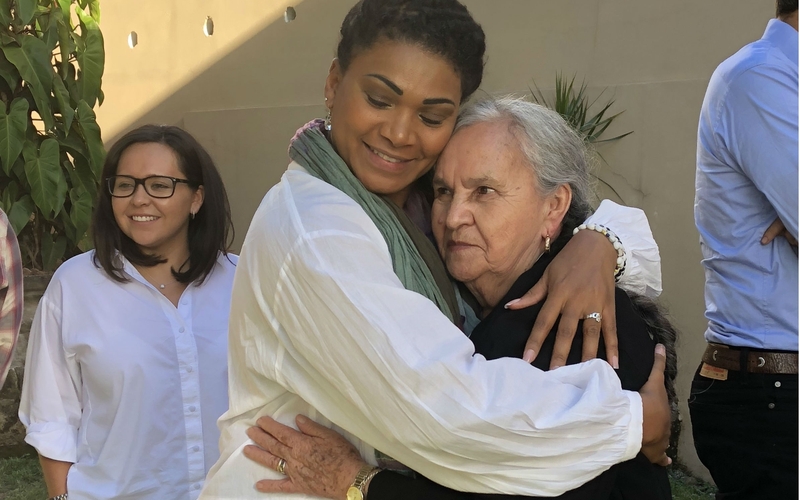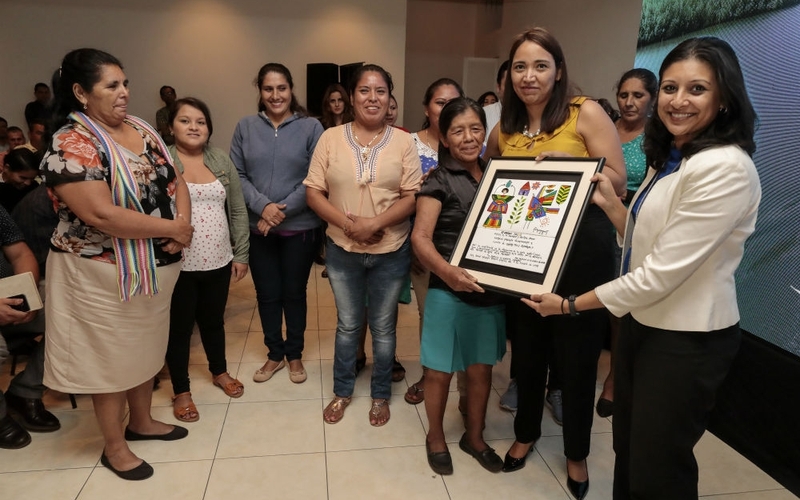Meet three leaders fighting to end the injustice of poverty in Central America.
You may not see them on Instagram. Or cable news. But they’re there.
A few months ago, I met three courageous human rights defenders on my first trip with Oxfam to Central America. I visited Guatemala, Honduras, and El Salvador to better understand why women, children, and men were fleeing their homes.
Each person—Jordan Rodas, Austra Bertha Flores López, and Juana Hernández—“deja una huella en el mundo” (leaves a mark on the world). They put their lives on the line to create a world in which no one is forced to abandon what they know for an uncertain future. The power of Oxfam’s work—the power of people against poverty—lies in their hands and others like them.
I want you to meet them. And I want you to share their stories.
Jordan Rodas
My first stop was Guatemala. There I met Jordan, the country’s human rights ombudsman. He’s in the pink tie standing alongside Oxfam leaders from around the world.

Jordan sits in the crosshairs. At great personal sacrifice he works to make sure that human rights are respected in Guatemala. For Jordan, it’s personal. It’s about life and death.
Few realize the civil war in his country ended only in 1996; it was a time of much hope and optimism for the future. But impunity and violence ever since have left too many Guatemalans afraid to speak their truth. To walk freely down their streets.
Jordan’s job is to work against these headwinds—to make sure that Guatemalan voices are heard. Strong forces are working against him: The UN’s anti-corruption commission has come under attack by the Guatemalan government. Gang and domestic violence destroy families while kids face threats trying to go to school. And the memory of 43 young girls who died in a fire at a government-run shelter for at-risk youth last year is still fresh in the minds of many.
The truth is Jordan isn’t fighting for this case or that case. He’s fighting for all the human rights abuses that haven’t been brought forward. And he knows his country is at a crossroads: The people will decide whether to invest in democracy and the belief that their institutions do not only serve the interests of the powerful. Or they will leave.
Austra Bertha Flores López
My next stop was Honduras. There I met Austra Bertha Flores López, pictured on the right embracing afro descendant artist and Congresswoman, Ashanti Crisanto.

Austra is the mother of the late indigenous environmental activist Berta Cáceres. Berta was murdered in 2016 for her efforts to stop the construction of a hydroelectric dam on sacred land.
We were there to learn about the ongoing trial of her daughter’s killers. The meeting brought together her two sons, artists like Ashanti, and local congresswomen. It was a powerful cross-section of Honduran society there in solidarity, united across differences by a common struggle for human rights.
When she spoke, she became emotional. She teared up talking about the trial. But just last week, Austra’s work and the support of this community for justice paid off: A Honduran court found seven men guilty of her daughter’s murder. It was another hard-fought victory in a lifelong commitment to activism and community service.
We didn’t end before talking about the silent suffering in Honduras and the need for women’s economic development. I left realizing that this struggle for human rights wasn’t about one daughter or even one mother. Austra’s lifelong fight showed me this was bigger than any one of us—a continuum of struggle that resonates on the deepest personal levels.
Juana Hernández
My last stop was El Salvador. There I met Juana Hernández, a water rights activist from the community of Las Mesas. She’s on the left holding a framed certificate of achievement alongside other women leaders for their activism.

Since 1997, Juana has led a women’s committee known as “Faith and Hope” to bring together her community to eliminate inequality and empower women. That work has taken her to the front lines of the fight for clean water. It’s an uphill battle—600,000 Salvadorans in rural villages lack access to clean drinking water and the country has one of the lowest rates of water consumption per citizen anywhere in the world.
Juana lives in a farming community mostly made up of people displaced by civil war. Every day she traverses rough terrain to collect water—which is often polluted. And she barely has enough to manage her daily activities, wash clothes, and take care of her poultry. Worsening drought only raises the stakes for why water is important for her farm and vegetable garden—and she’s not alone.
That’s why she and others are now fighting a bill to privatize water. Many women are leading this fight to ensure that private companies are not allowed to set prices and the terms of water usage, which would disproportionately impact the poor in rural communities like hers. Juana has become an agent of change for good, inspiring others to get involved and demand their rights.
So what next?
I came back thinking about the mark I want to leave on this world. What I need to do now to show community leaders across the world that Oxfam has their back. In my job, we talk a lot about resources like money—what we need to fix problems. But what you really need is something more priceless—people like Jordan, Austra, and Juana who are willing every single day to fight for what’s right. No money in the world can pay for that; it’s not a job, it’s a life mission.
So what's yours?
Be part of our movement to end the injustice of poverty.

